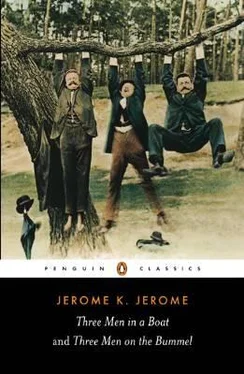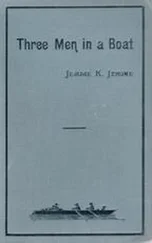Jerome Jerome - Three Men on the Bummel
Здесь есть возможность читать онлайн «Jerome Jerome - Three Men on the Bummel» весь текст электронной книги совершенно бесплатно (целиком полную версию без сокращений). В некоторых случаях можно слушать аудио, скачать через торрент в формате fb2 и присутствует краткое содержание. Жанр: Юмористическая проза, на английском языке. Описание произведения, (предисловие) а так же отзывы посетителей доступны на портале библиотеки ЛибКат.
- Название:Three Men on the Bummel
- Автор:
- Жанр:
- Год:неизвестен
- ISBN:нет данных
- Рейтинг книги:4 / 5. Голосов: 1
-
Избранное:Добавить в избранное
- Отзывы:
-
Ваша оценка:
- 80
- 1
- 2
- 3
- 4
- 5
Three Men on the Bummel: краткое содержание, описание и аннотация
Предлагаем к чтению аннотацию, описание, краткое содержание или предисловие (зависит от того, что написал сам автор книги «Three Men on the Bummel»). Если вы не нашли необходимую информацию о книге — напишите в комментариях, мы постараемся отыскать её.
Three Men on the Bummel — читать онлайн бесплатно полную книгу (весь текст) целиком
Ниже представлен текст книги, разбитый по страницам. Система сохранения места последней прочитанной страницы, позволяет с удобством читать онлайн бесплатно книгу «Three Men on the Bummel», без необходимости каждый раз заново искать на чём Вы остановились. Поставьте закладку, и сможете в любой момент перейти на страницу, на которой закончили чтение.
Интервал:
Закладка:
They are doing the same from the Memel to the Rhine. They are just tidying up the country. I remember well the Wehrthal. It was once the most romantic ravine to be found in the Black Forest. The last time I walked down it some hundreds of Italian workmen were encamped there hard at work, training the wild little Wehr the way it should go, bricking the banks for it here, blasting the rocks for it there, making cement steps for it down which it can travel soberly and without fuss.
For in Germany there is no nonsense talked about untrammelled nature. In Germany nature has got to behave herself, and not set a bad example to the children. A German poet, noticing waters coming down as Southey describes, somewhat inexactly, the waters coming down at Lodore, would be too shocked to stop and write alliterative verse about them. He would hurry away, and at once report them to the police. Then their foaming and their shrieking would be of short duration.
"Now then, now then, what's all this about?" the voice of German authority would say severely to the waters. "We can't have this sort of thing, you know. Come down quietly, can't you? Where do you think you are?"
And the local German council would provide those waters with zinc pipes and wooden troughs, and a corkscrew staircase, and show them how to come down sensibly, in the German manner.
It is a tidy land is Germany.
We reached Dresden on the Wednesday evening, and stayed there over the Sunday.
Taking one consideration with another, Dresden, perhaps, is the most attractive town in Germany; but it is a place to be lived in for a while rather than visited. Its museums and galleries, its palaces and gardens, its beautiful and historically rich environment, provide pleasure for a winter, but bewilder for a week. It has not the gaiety of Paris or Vienna, which quickly palls; its charms are more solidly German, and more lasting. It is the Mecca of the musician. For five shillings, in Dresden, you can purchase a stall at the opera house, together, unfortunately, with a strong disinclination ever again to take the trouble of sitting out a performance in any English, French, or, American opera house.
The chief scandal of Dresden still centres round August the Strong, "the Man of Sin," as Carlyle always called him, who is popularly reputed to have cursed Europe with over a thousand children. Castles where he imprisoned this discarded mistress or that-one of them, who persisted in her claim to a better title, for forty years, it is said, poor lady! The narrow rooms where she ate her heart out and died are still shown. Chateaux, shameful for this deed of infamy or that, lie scattered round the neighbourhood like bones about a battlefield; and most of your guide's stories are such as the "young person" educated in Germany had best not hear. His life-sized portrait hangs in the fine Zwinger, which he built as an arena for his wild beast fights when the people grew tired of them in the market-place; a beetle-browed, frankly animal man, but with the culture and taste that so often wait upon animalism. Modern Dresden undoubtedly owes much to him.
But what the stranger in Dresden stares at most is, perhaps, its electric trams. These huge vehicles flash through the streets at from ten to twenty miles an hour, taking curves and corners after the manner of an Irish car driver. Everybody travels by them, excepting only officers in uniform, who must not. Ladies in evening dress, going to ball or opera, porters with their baskets, sit side by side. They are all-important in the streets, and everything and everybody makes haste to get out of their way. If you do not get out of their way, and you still happen to be alive when picked up, then on your recovery you are fined for having been in their way. This teaches you to be wary of them.
One afternoon Harris took a "bummel" by himself. In the evening, as we sat listening to the band at the Belvedere, Harris said, a propos of nothing in particular, "These Germans have no sense of humour."
"What makes you think that?" I asked.
"Why, this afternoon," he answered, "I jumped on one of those electric tramcars. I wanted to see the town, so I stood outside on the little platform-what do you call it?"
"The Stehplatz," I suggested.
"That's it," said Harris. "Well, you know the way they shake you about, and how you have to look out for the corners, and mind yourself when they stop and when they start?"
I nodded.
"There were about half a dozen of us standing there," he continued, "and, of course, I am not experienced. The thing started suddenly, and that jerked me backwards. I fell against a stout gentleman, just behind me. He could not have been standing very firmly himself, and he, in his turn, fell back against a boy who was carrying a trumpet in a green baize case. They never smiled, neither the man nor the boy with the trumpet; they just stood there and looked sulky. I was going to say I was sorry, but before I could get the words out the tram eased up, for some reason or other, and that, of course, shot me forward again, and I butted into a white-haired old chap, who looked to me like a professor. Well, HE never smiled, never moved a muscle."
"Maybe, he was thinking of something else," I suggested.
"That could not have been the case with them all," replied Harris, "and in the course of that journey, I must have fallen against every one of them at least three times. You see," explained Harris, "they knew when the corners were coming, and in which direction to brace themselves. I, as a stranger, was naturally at a disadvantage. The way I rolled and staggered about that platform, clutching wildly now at this man and now at that, must have been really comic. I don't say it was high-class humour, but it would have amused most people. Those Germans seemed to see no fun in it whatever-just seemed anxious, that was all. There was one man, a little man, who stood with his back against the brake; I fell against him five times, I counted them. You would have expected the fifth time would have dragged a laugh out of him, but it didn't; he merely looked tired. They are a dull lot."
George also had an adventure at Dresden. There was a shop near the Altmarkt, in the window of which were exhibited some cushions for sale. The proper business of the shop was handling of glass and china; the cushions appeared to be in the nature of an experiment. They were very beautiful cushions, hand-embroidered on satin. We often passed the shop, and every time George paused and examined those cushions. He said he thought his aunt would like one.
George has been very attentive to this aunt of his during the journey. He has written her quite a long letter every day, and from every town we stop at he sends her off a present. To my mind, he is overdoing the business, and more than once I have expostulated with him. His aunt will be meeting other aunts, and talking to them; the whole class will become disorganised and unruly. As a nephew, I object to the impossible standard that George is setting up. But he will not listen.
Therefore it was that on the Saturday he left us after lunch, saying he would go round to that shop and get one of those cushions for his aunt. He said he would not be long, and suggested our waiting for him.
We waited for what seemed to me rather a long time. When he rejoined us he was empty handed, and looked worried. We asked him where his cushion was. He said he hadn't got a cushion, said he had changed his mind, said he didn't think his aunt would care for a cushion. Evidently something was amiss. We tried to get at the bottom of it, but he was not communicative. Indeed, his answers after our twentieth question or thereabouts became quite short.
In the evening, however, when he and I happened to be alone, he broached the subject himself. He said:
"They are somewhat peculiar in some things, these Germans."
Читать дальшеИнтервал:
Закладка:
Похожие книги на «Three Men on the Bummel»
Представляем Вашему вниманию похожие книги на «Three Men on the Bummel» списком для выбора. Мы отобрали схожую по названию и смыслу литературу в надежде предоставить читателям больше вариантов отыскать новые, интересные, ещё непрочитанные произведения.
Обсуждение, отзывы о книге «Three Men on the Bummel» и просто собственные мнения читателей. Оставьте ваши комментарии, напишите, что Вы думаете о произведении, его смысле или главных героях. Укажите что конкретно понравилось, а что нет, и почему Вы так считаете.










